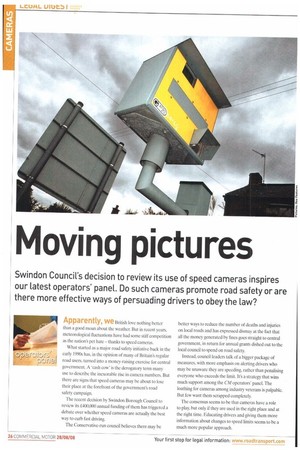Moving pictures
Page 26

If you've noticed an error in this article please click here to report it so we can fix it.
Swindon Council's decision to review its use of speed cameras inspires our latest operators' panel. Do such cameras promote road safety or are there more effective ways of persuading drivers to obey the law?
Apparently, we British love nothing better than a good moan about the weather. But in recent years. meteorological fluctuations have had some stiff competition as the nation's pet hate — thanks to speed cameras.
What started as a major road safety initiative back in the early 1990s has, in the opinion of many of Britain's regular road users, turned into a money-raising exercise for central government. A 'cash cow' is the derogatory term many use to describe the inexorable rise in camera numbers, But there are signs that speed cameras may be about to lose their place at the forefront of the government's road safety campaign.
The recent decision by Swindon Borough Council to review its £400,000 annual funding of them has triggered a debate over whether speed cameras are actually the hest way to curb fast driving.
The Conservative-run council believes there may be better ways to reduce the number of deaths and injuries on local roads and has expressed dismay at the fact that all the money generated by fines goes straight to central government, in return for annual grants dished out to the local council to spend on road safety.
Instead, council leaders talk of a bigger package of measures, with more emphasis on alerting drivers who may be unaware they are speeding, rather than penalising everyone who exceeds the limit. It's a strategy that wins much support among the CM operators' panel. The loathing for cameras among industry veterans is palpable. But few want them scrapped completely.
The consensus seems to be that cameras have a role to play, but only if they are used in the right place and at the right time. Educating drivers and giving them more information about changes to speed limits seems to be a much more popular approach.




































































































































































